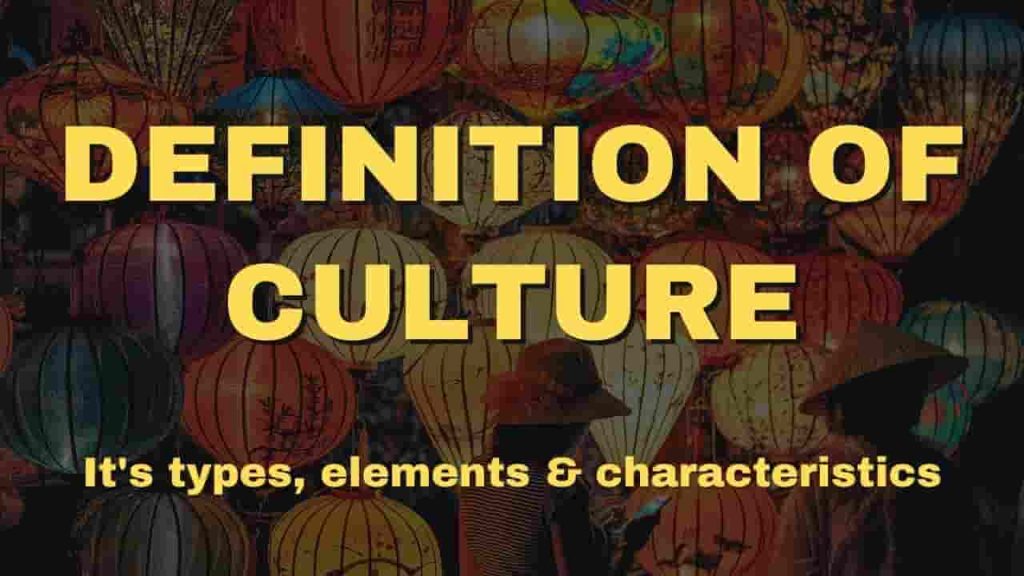Definition of Culture by Sociologist
It is an emergent web of representations, holistically encompassing the deep- set value, belief, and symbolic systems of a natural collectivity, such as the tribal societies to which he gave such close attention
Emile Durkheim
Culture served to justify inequality. The ruling class, or the bourgeoisie, produces a culture that promotes their interests, while repressing the interests of the proletariat. His most famous line to this effect is that “Religion is the opium of the people”.
Marx
Definition of Culture by Anthropologist:
Edward Tylor, a 19th-century British anthropologist, provided the first anthropological definition of culture:
Culture is a diverse whole that involves knowledge, religion, literature, law, morality, tradition, and all other abilities and habits that man has gained as a part of society.
What is Culture?
Definition: Culture is a way of life for humans. It is their behavioral style that has been shaped by humans.
Intangible (non-material) objects such as ideals, attitudes, norms, vocabulary, and ideas (ideologies: interpretation of reality) that regulate the way of life are examples of culture. This way of life, which incorporates both material and non-material things, was produced by humans. As a result, some anthropologists refer to it as a man-made component of the environment.
Characteristics of Culture:
Universality:
Culture is a common concept.There is no such thing as a tradition-free society. There are also cultural elements that can be seen in nearly all communities. For example: Marriage and families, faith, schooling, political structure, environment, and athletics, are seen all over the world. Societies have established values, traditions, attitudes, and other behavioral behaviors that influence the marriage and family structure. Such a phenomenon can be seen all over the world, and it applies to religion, schooling, political activity, economic behavior, and so on.
Variability:
The universals of culture vary in their applicability. Looking at the institution of marriage and families, one can see a great deal of diversity within Pakistan, despite variations in other societies. Arranged marriages, love marriages, swap marriages, marriages by acquisition, marriages within and outside the kin network are all common in Pakistan.
There were variations in wedding ceremonies around the world. Other aspects reflecting the variability of the family in Pakistani society include joint families and nuclear families, single-earner families and dual-earner families, patriarchal families and egalitarian families, patrilocal families and matrilocal families.
Similarly, there are religious differences all over the world. Different nations’ political systems include kingship, monarchy, independence, representative form of democracy or presidential form, adult franchise or limited voting rights, and voter age. Economic regimes often differ from one another, ranging from the extremes of democracy and capitalism to some difference on the spectrum.
Learned:
Interaction with others teaches us about culture. It is not passed on by a biological mechanism. When our elders teach us, we learn to communicate, walk, and act. Nature has given us the ability to communicate, but we speak a number of languages, all of which were developed by humans, and there is a great deal of difference both within and outside of Pakistan. Also Humans have the ability to understand a wide range of languages. Other modes of living or history.
Shared:
Culture is not the domain of a single person or party. It is distributed to other members of society. You are sharing television transmission with others, a classroom with others, a path with others, and information with others. Since you are a social person, you share culture with others.
Transmitted:
Culture does not end with the death of a person or group. During their lifespan, the person or community attempts to pass on their culture to future generations. This is because each new generation of babies does not start from scratch, but rather builds on what they have already been given. That is how society develops and our culture gets richer and richer.
Changing:
Culture is constantly evolving. The habits of behaviour passed down from generation to generation are constantly being modified to meet the changing needs of the moment and the demands of people. New inventions are developed and copied from other cultures and communities.
Culture vs. Nation vs. Society
Culture: Culture is a way of life that everyone shares.
Nation: A nation is a political body with defined boundaries.
Society: The organized interaction of citizens within a country or other boundary.
Elements of Culture:
Symbols:
A Symbol is something that has a specific meaning recognized by people who share culture. Symbols include whistles, blinking lights, and thumbs up. Humans have the ability to construct symbols with various meanings associated with each. These symbols are used to communicate and have become a part of our vocabulary.
Also houses, clothing, the flag, and a particular colour may be interpreted as symbols representing some form of human activity as well as society’s outlook. Each of the colors, red, green, white, blue, and yellow, represents something in society. Blue jeans are widely worn in Pakistan.
Language:
It is a symbolic mechanism that enables members of a group to interact with one another. Symbols may be both oral and written language. We have spiritual practices that are passed down orally. As part of written literature, humans have produced various alphabets. The primary means of cultural transmission is language.
Values:
Desirability, virtue, and appearance are culturally established ideals that act as broad criteria for social life. Equal opportunities, achievement or accomplishment, material convenience, activity work, s cience, liberty, physical education, health, punctuality, wealth, education, competition, merit, Honesty, labor dignity, patriotism Democracy and justice are examples of values.
Beliefs:
People’s beliefs in specific claims. Values are broad concepts that serve as the foundation for values. Values are general standards of goodness, while views are specific matters that people believe to be true or false.
Norms:
The rules and standards that govern a society’s members’ actions.
These are the people’s shared beliefs, which regulate their actions.
Proscriptive norms: dictating what we can and should not do. Certain activities are prohibited.
Prescriptive norms: It is about what we should do
Types of Culture
Ideal culture: Social habits dictated by traditional principles and traditions are referred to as ideal cultures. The ideal values and standards that prevail in society.
Real Culture: Actual Social Patterns are just approximations of societal perceptions. The values and standards that people actually adhere to. That may also be the number of individuals who adopt these cultural traditions. Or how closely an individual pays attention to a cultural trend. Since this can be explained numerically, it can often be referred to as a statistical pattern.
Material Culture: Material culture is also known as tangible culture. This culture refers to the physical objects, resources, and spaces that people use to describe themselves. As a result, some anthropologists refer to it as a man-made component of the environment.
Non-material Culture: Non-material Culture is also known as intangible culture. It is not possible to touch, feel, taste, or keep it. Intangible (non-material) things that rule one’s way of life, such as ideals, beliefs, norms, vocabulary, and ideas (ideologies: interpretation of reality). The manner in which we carry out our responsibilities.
How culture affects communication?
Culture and communication have big influence on each other. Culture plays a very important role in shaping the style of communication. People generally respond to how we talk rather than what we say. So the culture in which individuals are socialized influences the way they communicate, and the way individuals communicate can change the culture too.
How culture and society are related?
Culture and society are intricately related. A culture is made up of the “things” of a society, while a society is made up of individuals who share a similar culture.
Why culture is important in our society?
Culture develops a sense of belonging, personal and cognitive growth, and the ability to empathize and relate to each other. Culture is how we do our thing. It matters because it defines us.
Health and fitness, self-esteem, capacity growth, social capital, and economic return are all direct advantages of a healthy and lively society.
Why culture matters in international business?
In a business context, culture relates to what behavior is common and accepted professionally in one location as compare to another. What may be acceptable business practice in one country, but may be very different from the approach that is used by businesses overseas.
Why culture matters in international business?
So answer is to avoid misunderstandings between colleagues and clients, and also to make sure that businesses are presenting themselves to their new market in the best way they can.
For more click here and if you are looking for full forms of different acronyms and words then check out this list you really gonna find this helpful. We also have an Essay on every topic, Check the complete list here. If you are Studying in Matric Free Video Lectures of Maths, Physics and English are here, and we have got you covered for I.COM Business Maths also.




